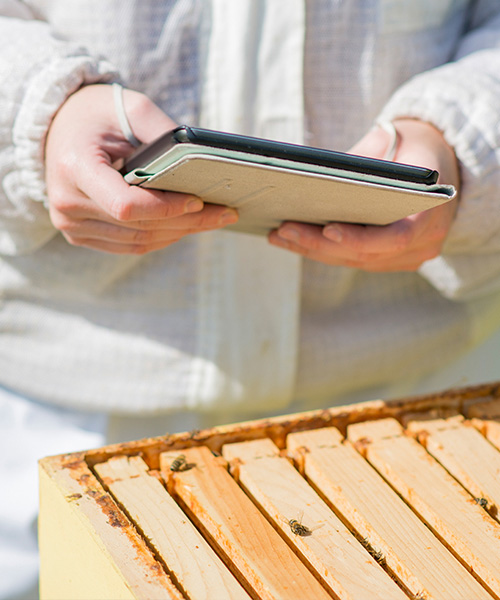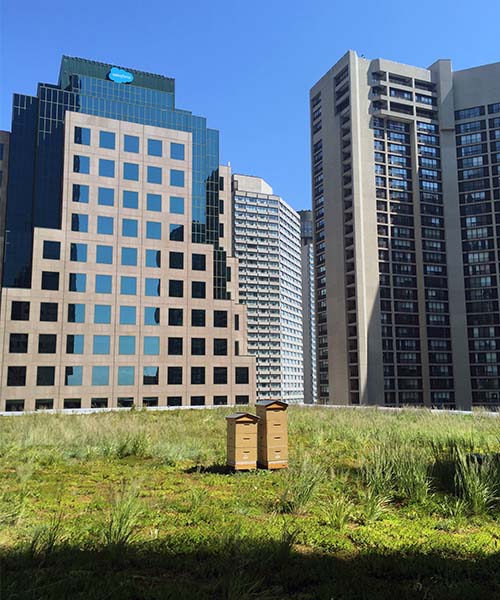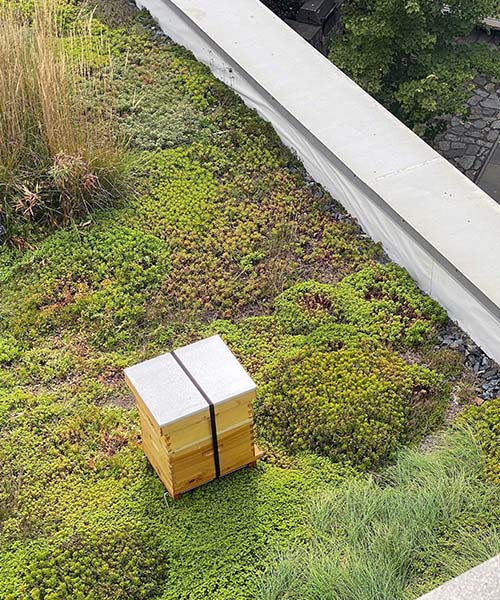New partnership and innovative upgrade to Alvéole’s urban beekeeping service
Alvéole has launched a new partnership and innovative upgrade to their urban beekeeping service, focused on collecting data, improving local plant diversity, and fostering tenant engagement. With their new partner APILAB, a scientific research firm concentrating on honey bees, they are able to assess honey bees’ health to determine the quality of the environment surrounding urban hives. By analyzing the pollen, the honey, and the bees, they can determine the health of the colony and the quality of biodiversity in a given area.
-

-
By partnering with Alvéole, APILAB is now the biggest biomonitoring network specialized in bees’ health in the world. The main goal of this network is to produce and share knowledge worldwide and better understand the causes of bee mortality. Therefore, the data will not only contribute insightful knowledge to the scientific world, but Alvéole clients will also receive a social and environmental Impact Assessment. This includes data evaluating the quality and richness of the local floral diversity, and actionable recommendations to improve it.
It was at World Bee Day, on May 20, 2022, that Alvéole launched this complement to their urban beekeeping amenities. To mark this important day, Alvéole joined Meirav Even-Har, QuadReal Property Group, and Benjamin Poirot, APILAB, to discuss how urban beehives can positively impact ESG scores and influence local floral diversity.
To watch (or rewatch) the World Bee Day webinar, click the link below and sign up for the recording.
-

-
CHAMPIONING BIODIVERSITY THROUGH ESG
Companies are expected by investors to report on their corporate environmental performance. Having a strong ESG management plan strategy and consistently working to improve ESG performance is now a necessity for all companies, and the Commercial Real Estate industry is no different. As the environmental impacts of companies become clearer, biodiversity is moving up on the list of priorities and that is where data collection and reporting become so important.
In 2021, the Taskforce on Nature-related Financial Disclosures (TNFD) was launched to create a standardized way for organizations to measure and report on threats to wildlife and ecosystems. The goal is to support organizations in moving away from nature-negative outcomes and toward nature-positive outcomes by incorporating nature-related risks and opportunities into their strategic planning, risk management, and budgeting decisions.
As Global risk intelligence company Verisk Maplecroft states in their Environmental Risk Outlook 2021 report, it is important to factor nature into measures of financial performance and properly value biodiversity.
-

-
BIODIVERSITY LOSS IN CITIES
Urbanization is increasing worldwide and is one of the biggest threats to biodiversity. As explained in Environmental factors affecting bee diversity in urban and remote grassland plots in Boulder, Colorado (Kearns & Oliveras), urban growth is removing native plants to make space for buildings, concrete, and heavily manicured parks. Native plants are often limited to unmanaged landscapes. Pollinators rely on native plants for food and these small remaining patches of nature may not be enough to support them.
Transformation of the natural landscape due to urbanization means a change in the nesting sites available to bee species, as well. As we can read in the Annals of the Entomological Society of America:
“The fragmented nature of urban habitats may prevent colonization by certain bee species, whereas the frequency and intensity of disturbance within sites (e.g., mowing, soil turning, and development) may limit the long-term persistence of others. Bee species that build nests in soil may be selectively excluded by the compacted soils that characterize many urban parks and gardens”.
BIOMONITORING AS A SOLUTION
Biomonitoring is a way of evaluating the environment via plants or animals. Because bees fly, forage, and drink within a 3 KM radius of their beehive, they act as data collectors, making them excellent indicators of environmental quality.
“We’ve been working closely with scientists to monitor honey bee collapse disorder, and implementing beekeeping procedures that help ensure a high survival rate of our colonies. We realized that all the data we’ve been tracking from our own beehives could benefit all pollinators, and have a positive impact on urban areas” says Alex McLean, CEO and Co-founder of Alvéole.
By analyzing the pollen and honey produced at each site throughout the season, it is possible to track which flowers are blooming and when. With this information, we can recommend which plants are needed to increase local floral diversity and support pollinators. By gathering data from the bees year after year, we can monitor the impact buildings and human interaction have on the local diversity
ABOUT APILAB
APILAB is an international research bureau specializing in environmental monitoring using honey bees. Over the past 10 years, APILAB has developed novel methods to monitor the status of the environment through beehive analysis. APILAB’s technical expertise focuses on assessing the impact of human activities on the environment and bee health. By monitoring and evaluating the effectiveness of actions in favor of biodiversity at the local level, they are able to collect scientific data to better understand bees’ mortality. This network has produced multiple scientific papers on the matter,
including a study on the impact of combustion residue on the health of bees.
APILAB is also a member of 1% for the Planet.